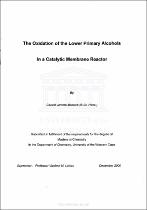| dc.description.abstract | Methanol and ethanol are important chemical feedstock used in industrial chemistry, since they are the starting materials for the synthesis of various products, including hydrocarbons and mild oxidation products. For instance, methanol can be oxidised to methyl format, which can be transformed into industrially important products such as N, N-dimethyl formamide or acetic acid. Both methanol and ethanol have also been used as probe reactions, in which they are used to characterise catalysts according to the type of active sites presents, namely redox, acidic or basic. The lower primary alcohols are also currently being used in fuel cell research, since the oxidation of alcohols has been proposed as an anode reaction for fuel cells. ln the latter case, the important reaction is the complete oxidation of the alcohol to carbon dioxide and water. lt is apparent from industrial examples that methanol oxidation can lead to various products by varying the nature of the catalyst and the reaction conditions. | en_US |

